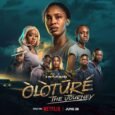The Encounter
Amarachukwu Onoh, Gregory Ojefua, Stan Nze
Stop that nonsense. Acting like a bloody Nigerian
Tolu Ajayi
Egbemawei Sammy and Frederick Anyaegbunam
2017
Acting & Directing
There is a saying “Those who cannot remember the past are doomed to repeat it”. The Encounter, based on the short story of the same name by the historian, Henry Onyema, screenplay written by Egbemawei Sammy and Frederick Anyaegbunam and directed by Tolu Ajayi is set in 1967 during the Nigeria-Biafra civil war and chronicles a meeting between Major Emmanuel Ifeajuna (played by Amarachukwu Onoh) major and Biafran Commander-in-Chief General Odumegwu Ojukwu (played by Gregory Ojefua). The movie tells an untold and completely rapturing story and is a timely remember of Nigeria’s flawed history. For those who may not know the Biafran war for independence or the illegal Biafran secession (it depends on who you ask) is the singular most contentious and controversial issue in Nigeria’s history and this short film anchored by two spellbinding performances dissects it. For a movie where we already know the end, it somehow manages to still surprise us.
The movie starts with a simple yet fascinating premise. Put two men in a room and watch them talk. Except these men are not mere men but rather two complex characters with perhaps of the darkest legacies in Nigerian history. A failed coup plotter and a failed secessionist. With one man’s life in the others hands. Put together. To have an encounter. The movie thoroughly explores this unique juxtaposition and while what the viewer certainly expected was fireworks, he was pleasantly surprised to find instead a power yet subtle and nuanced film consisting of a great script, directing and acting. I must admit that this reviewer began the movie with equal parts of misgivings and excitement because although director is not a historian and a movie is fiction and some reviewers think the climate of a society a movie exists is irrelevant to critic, I was wary of open bias and ethnic propaganda. This is because context can sometime be everything, and for this movie there is a lot of context. It was released in a Nigeria with a portion of the population numb to its history and another portion agitating for its repeat. Either way Nigerian movies rarely aim for the lofty heights of social impact and with its stunning opening shot and a few words scrawled on a screen the filmmakers achieved that while making a great film.
It would be criminal not to begin the review with a written ovation to the set and costume designers whose remarkable attention to detail accompanied by a haunting soundtrack transport the viewer in every sense but the physical to the Igbo town during the civil war. Their efforts were complemented by the directing of Tolu Ajayi which although imperfect created a movie littered with so many individual moments of cinematic brilliance it would be too many to list. A moment of brilliance which stands out is the scene where we, after much anticipation, meet Ojukwu for the first time and yet we don’t, not really, as he stands in the shadows looming like a spectre. This leads me to perhaps the best part of this movie, the acting! The acting by both actors was overwhelmingly good but there is an erratic and volatile quality which could as easily be just poor acting or maybe deliberate but it makes for an unpredictable entertaining encounter.
Special credit has to be given to Gregory Ojefua who is slowly carving out a niche in Nollywood by taking on the most ambitious and challenging roles and who delivers the best line I have possibly ever heard heard in a Nollywood movie.
“Stop that nonsense. Acting like a bloody Nigerian”
The movie does sometime feel like nothing more than a brief history lesson about the two characters with dialogue structured from a Wikipedia entry and there is the occasional fluctuating accent and the delivery, perhaps because of how complex the characters are, was sometimes lacking. But the movie at its highs, it is an intoxicating high. And there are more highs than low. If the makers aimed for a sobering history lesson, it was not attained. This is because it is ironic that a movie about one of Nigeria’s most shameful points in history because of its share quality made me proud to be Nigerian. You think learning can’t be fun? Watch the encounter.







